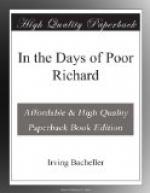“With Sir Benjamin, the duel has been a help instead of a hindrance,” said the young man. “My stubborn soul has been the great obstacle.”
Then he told of his interview with Sir Benjamin Hare.
Franklin put his hand on Jack’s shoulder and said with a smile:
“My son, I love you. I could wish you to be no different. Cheer up. Time will lay the dust, and perhaps sooner than you think.”
“I hope to see Margaret to-morrow morning.”
“Ah, then, ‘what Grecian arts of soft persuasion!’” Franklin quoted. “I hope that she, too, will follow the great star in the west!”
“I hope so, but I greatly fear that our meeting will be prevented.”
“Did you get my note of to-day at your lodgings?” Franklin asked.
“No,” said Jack. “I left there soon after ten.”
“Lord Chatham has kindly offered to secure admission for you and me to the House of Lords. He is making an important motion. Come, let us go and see the hereditary legislators.”
Lord Stanhope met them at the door of the House of Lords. There was a great bustle among the officers when His Lordship announced their names and his desire to have them admitted. The officers hurried in after members and there was some delay, in the course of which the Americans were turned from the division reserved for eldest sons and brothers of peers. Not less than ten minutes were consumed in the process of seating Franklin and his friend.
Soon Lord Chatham arose and moved that His Majesty’s forces be withdrawn from Boston. With a singular charm of personality and address, the great dissenter made his speech. Jack wrote in his diary that evening: “The most captivating figure that ever I saw is a well-bred Englishman trained in the art of public speaking.” The words were no doubt inspired by the impressive speech of Chatham, which is now an imperishable part of the history of England. These words from it the young man remembered:
“If the ministers thus persevere in misleading and misadvising the King, I will not say that they can alienate the affection of his subjects from his crown, but I will affirm that they will make his crown not worth his wearing; I will not say that the King is betrayed, but I will say that the kingdom is undone.”
Lord Sandwich in a petulant speech declared that the motion ought not to be received. He could never believe it the production of a British peer. Turning toward Franklin, he flung out:
“I fancy that I have in my eye the person who drew it up—one of the bitterest and most mischievous enemies this country has ever known.”
“Franklin sat immovable and without the slightest change in his countenance,” Jack wrote in a letter to The Pennsylvania Gazette.
Chatham declared that the motion was his own, and added:
“If I were the first minister of this country, charged with the settling of its momentous business, I should not be ashamed to call to my assistance a man so perfectly acquainted with all American affairs, as the gentleman so injuriously referred to—one whom all Europe holds in high estimation for his knowledge and wisdom, which are an honor, not only to England, but to human nature.”




